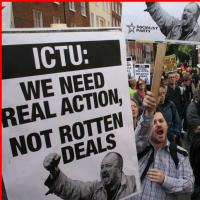
Stark crisis of leadership facing working class
On Saturday 9 February, the Irish Congress of Trade Unions (ICTU) organised a country-wide day of protest action around the slogan, ‘Lift the burden – jobs not debt’, in the major cities and towns across Ireland, including Dublin, Cork, Galway, Waterford, Limerick and Sligo.
The aim of the protests, according to ICTU, was to send a message across Europe that the €64 billion bank debt which workers in Ireland are being forced to pay is unsustainable. But the intention of the ICTU leaders was also, essentially, to support the Irish coalition government’s austerity efforts – particularly the junior coalition partner Labour Party – to secure a “better deal”. This is a continuation of ICTU’s policy of co-operation with the government, in order to quell the discontent in society, hold back struggle and allow the implementation of the austerity programme.
A more blatant abdication of their official role as defenders of and fighters for workers’ interests would be difficult to imagine. This mealy-mouthed stance came after two full years in which the trade union leadership were virtually absent from all areas of social, economic and political discourse in Ireland (the last significant action organised by the ICTU was a demonstration in Dublin of roughly 80,000, in November 2010, following the sell-out austerity agreement between unions and government, known as the Croke Park Deal).
This also coincided with the most savage onslaught of austerity on working class people in the history of the State, leading to widespread demoralisation of workers and the unemployed.
Under pressure from those that are opposing austerity, such as the Campaign Against Household and Water Taxes (CAHWT), and in an attempt to channel opposition down a more innocuous route, the protests were called. The intention by ICTU leaders is to be seen to do something, regardless of how ineffective or whether it is what their members are actually pressing for. Like other ICTU organised events in the recent past, the idea is that marching will let off steam, while the union leadership goes back into “talks” with the government. But these tactics are beginning to wear thin and the lack of any strategy from ICTU is becoming ever clearer.
By spinning figures of 110,000 participants across Ireland on the protests on 9 February, the ICTU leadership are keen to talk up their strength and authority, but this markedly contrasts with the attitude of those very participants – mainly rank and file trade unionists. Many left the protests in disgust. In Dublin, instead of hearing a fighting strategy being offered by the trade union movement, the ICTU General Secretary, David Begg, made a short contribution – before the vast bulk of the crowd had even gathered at the stage– and then the platform was left to various comedy and music performers. “We didn’t come here to be entertained!” was the angry cry of one woman, which summed up the mood of many others.
Role of campaign against unfair taxes
This aversion by ICTU leaders to addressing the thousands of protesters is the result of being heckled on such occasions in the past, most notably on the demonstration on November 2010 and more recently on a pre-budget march in Dublin, in November 2012.
A more accurate estimate for numbers taking part on the 9 February protests is around 60,000. In Waterford, a city with a tradition of working class militancy, where 15,000 people marched in November 2012 to oppose the closure of a local hospital , only 2,000 came out for the 9 February demonstration. This, and the turnout overall – which was probably half of what the ICTU hoped for – is undoubtedly a sign of the diminished authority of the ICTU among working class people.
There is a crisis of real leadership facing the Irish working class, which is under ferocious attack. Space is opening up for genuine campaigns that challenge austerity to fill the void. The Campaign Against Household and Water Taxes (CAHWT) and the battle against the Property Tax have a crucial role to play in this context, with 50% of single home owners continuing to boycott the Household Tax. The unwarranted harassment of CAHWT organisers by ICTU stewards on the 9 February demonstrations, of which there were many cases, shows that perhaps the ICTU bureaucracy also understand this possibility.
On 11 February, on the suggestion of the Socialist Party, the CAHWT staged direct action protests and occupations of local council meetings, as a way of stepping up the political pressure on the Labour and Fine Gael coalition parties. In one protest, five people were arrested, including Paul Murphy MEP and three other Socialist Party members. These incidents were widely covered by the Irish media. Similar actions, increasing political pressure, will be a feature of the activity of the tax campaign in the coming months.


Be the first to comment